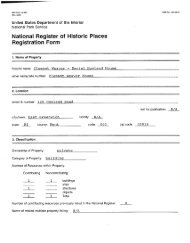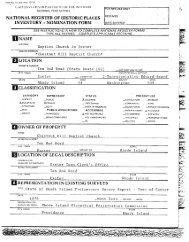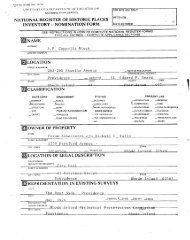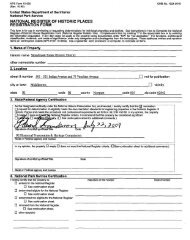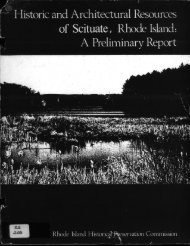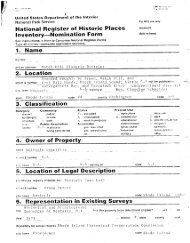1 Dr. Jonathan Prude, Emory University “The Great Transformation ...
1 Dr. Jonathan Prude, Emory University “The Great Transformation ...
1 Dr. Jonathan Prude, Emory University “The Great Transformation ...
You also want an ePaper? Increase the reach of your titles
YUMPU automatically turns print PDFs into web optimized ePapers that Google loves.
8But gauging what industrialization meant to the southern New England countrysiderequires realizing that this multi-faced process was controversial. Here, it’s true, we need toconnect local developments with wider contemporary currents. Because what happened in thecommunities of this region was importantly framed by contesting attitudes swirling across theNortheast--and indeed the nation.Thus, on one side, Thomas Jefferson early on urged that Americans preserve the virtuousindependence central to republicanism by remaining landholding husbandmen rather thansuccumbing to the dependency of wage labor, including industrial wage labor. “While we haveland to labor, then,” ran his famous late eighteenth century pronouncement, “let us never see ourcitizens occupied at a work bench...[L]et our work-shops remain in Europe.” As the UnitedStates moved into the 19th century, antipathy to waged hirelings was supplemented by stories ofhorrid conditions festering in English factory cities--conditions frequently contrasted to thisnation’s splendid natural vistas. In fact, combined with the spiritual impulses of the Second <strong>Great</strong>Awakening, salutes to scenery in America molted into outright sacrilzations of the Americanrustic. The notion grew that nature in America was particularly imprinted with the Divine, a“lecture...bound by the Almighty,” and that--consequently--the nation bore special responsibilitynot to permit its hinterland to devolve into ghastly encampments of urban industrialization.Further cautionaries involved worry that employment inside manufactories would pulltoo many people from husbandry. “Oh, sir, my boys have all left me and turned shoe-peggars,”ran a lament in the Old Farmer’s Almanack in the 1830s. “If this is the way things are going on,our farms must soon run up to bushes.” There was worry, too, that the opportunity to sell toindustrial employees might pull farmers too far into the market, causing them to surrender theircore value of striving for sufficiency rather than gain, of foresaking the prosperity that (as onewriter had it) “money cannot purchase, and money cannot measure...” And there were suspicionsthat outworkers living at home were evincing unsettling new autonomy. For there were whispersof outworkers coming to believe that the wages they received from weaving or toiling on palmleafhats were theirs and should be used as they wished rather than surrendered to the corporate



